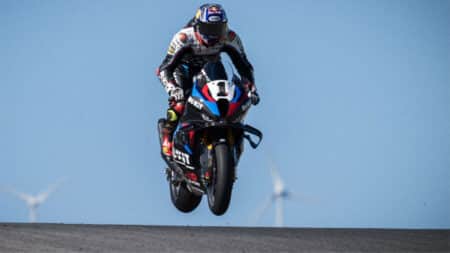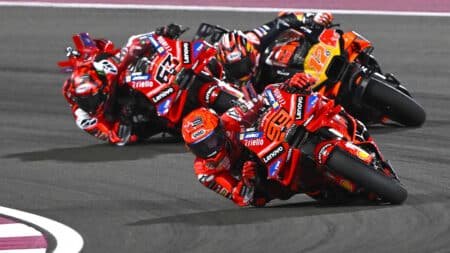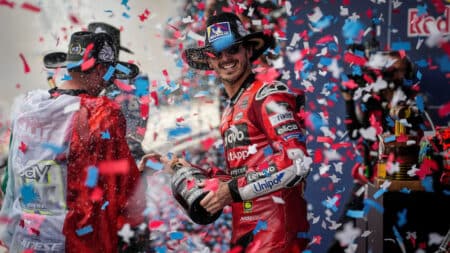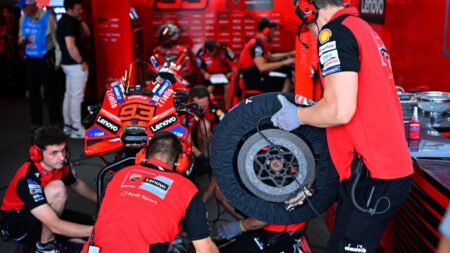
Honda gets serious: Toprak and Acosta in its MotoGP sights
Honda’s MotoGP project currently has huge momentum, which is why it’s jumping early into the 2026/2027 rider market, chasing Toprak Razgatlıoğlu and Pedro Acosta
“I didn’t see the touch, but I think Marc should be penalised for two or three seasons!” That was Valentino Rossi’s take on the latest Márquez controversy on Sunday.
Personally, I think the nine-time champ is being a bit harsh on the kid. I think Márquez should be handed another two-point penalty. This, in addition to the two points he got for not respecting yellow flags during Silverstone warm-up, will take him to four points. And that would mean he must start the next race from the back of the grid.
The next race is Sepang. Think about it: a longer than usual drag to the first turn, then plenty of fast, wide corners and long straights. I think Márquez would be tenth by Turn One, sixth by the end of the first lap, third by the end of the second lap. And then? Somehow I think the reigning Moto2 champ – who won last year’s Valencia Moto2 race from the back row of the grid (after committing another misdemeanour during practice) – would relish the challenge.
Rossi, of course, was only joking when he suggested a hefty punishment for the 20-year-old who may well inherit the Italian’s (often disputed) mantle as the greatest bike racer of all time. What he really said was, “I think Marc should be penalised for two or three seasons – it will make racing a lot more easy!”
Race Direction’s decision to delay its hearing into the Márquez/Dani Pedrosa incident until the eve of the Malaysian Grand Prix will allow all kinds of conspiracy theories to ferment over the next few days. Some people want the kid roundly punished. Others don’t want him punished at all. And both sides will be doing everything they can to get their opinions heard in the corridors of power.
Márquez didn’t do anything truly awful at Aragon. He rode like he always rides, with very little margin for error, so little in fact that his clutch lever scraped Pedrosa’s swingarm (what?!), severing a vital electronics cable, with disastrous consequences for his team-mate.
Some riders like Jorge Lorenzo think it’s wrong to ride with no margin for error. The reigning MotoGP champ complained that Márquez has already crashed 10 times this season (in fact it’s 12). Well, Lorenzo crashed eight times in his rookie MotoGP season and Yonny Hernández has lost it 15 times this year.
Others think that Márquez’s win-it-or-bin-it style is the only way to race, including Cal Crutchlow, who has also crashed 12 times this year. For the record, the other frequent fallers are Bryan Staring on 11 and Andrea Iannone and Lukas Pesek, both on 10.
In considering whether to penalise Márquez, Race Direction can also take into account earlier crimes, of which Márquez has a few. Certainly Sunday’s clash with Pedrosa wasn’t worthy of punishment. It’s the sort thing that happens all the time in the smaller classes and often enough in the big class.
Pedrosa did crash because of the collision, but he wouldn’t have crashed if his RCV’s rear-wheel speed sensor cable hadn’t been in such an exposed position. The ever-luckless Spaniard (whose 28th birthday party on Sunday evening must’ve been a somewhat muted affair) is once again out of the title hunt, while Honda have learned a useful bit of R&D, which, after all, is supposed to be what racing is all about. Right now, HRC engineers will be busy in Asaka rerouting the sensor cable and making sure nothing like that can happen again.
Their colleagues in the software department may also be toiling away, reprogramming the RCV’s default engine-management setting, which instantly switched to full power when the cable was broken. So as Pedrosa opened the throttle, he got the shock of his life: full horsepower which overpowered the rear tyre and kicked the bike sideways. Pedrosa instinctively closed the throttle and got thrown over the highside as the tyre gripped again, just as if he’d been on a 500. The crash certainly illustrated how riders rely on traction control at every corner.
This is far from the first time that an electronics glitch has hurled a rider to his fate. We probably don’t get to hear about most of them, but a few years ago Randy de Puniet was mysteriously highsided at Turn Two at Catalunya. Turned out that his Kawasaki’s engine management had been mistakenly reset by the lap trigger on the start-finish straight, which switched the system to default mode, which also meant full power. Is that a sensible default setting?
On Sunday a warning light would certainly have started flashing to tell Pedrosa that his rider aids had gone AWOL, but he would not have had time to see it before he was ejected.
When Race Direction sit in judgement at Sepang they are able to take into accounts previous crimes, which makes this decision far from black and white, even if they surely couldn’t punish Márquez solely for what happened at Aragon.
Dorna have one place on Race Direction and I wonder which way they will vote. They surely adore Márquez, because his grinning character and all-attack riding style have given MotoGP the kick up the arse it so badly needed.
For years they’ve been staring into the abyss, wondering what will happen when Rossi retires and perhaps a third of the global TV audience switches off its televisions, trashing TV and sponsorship income. Now they need worry no more. Márquez may not have the pop star appeal of Rossi, but he makes up for whatever he lacks with his heavy metal riding.
So Dorna want to keep Márquez sweet and no doubt would love him to be champion this year. But they might also be looking at the 39 point gap between Márquez and Lorenzo and wondering if it might be worth reducing the Yamaha man’s disadvantage to keep the fight alive until the Valencia finale. That hasn’t happened since 2006 when it went down to the wire with Rossi and Nicky Hayden. We all remember that day – it was easily the highpoint of MotoGP so far.
What am I saying? Of course, no one would allow outside factors to influence their decision in such an important matter. Silly me…
I also wonder what is going on at Honda. Honda always say (quite rightly) that they don’t believe in team orders. But Pedrosa is effectively out of the title battle, so no doubt HRC will talk to both riders and suggest they keep out of each other’s way, just as they did after the pair clashed at Misano. Márquez would have certainly got a bit of a ticking off from HRC vice-president Shuhei Nakamoto at Aragon, but judging by the width of Nakamoto’s smile in parc fermé, he wasn’t too annoyed.
The thing is that Pedrosa will not give up until the title is a mathematical impossibility, so he will probably race Márquez as hard, or even harder, as he did before the Aragon incident. And anyway, like Márquez, he already has a 2014 HRC contract, so he doesn’t really need to do what he’s told.
We’ve been here before. You may remember that two weeks before the 2006 Valencia GP we went to Estoril, where title leader Nicky Hayden and Pedrosa – who was effectively, but not mathematically, out of the title hunt – were going at it hammer and tongs.
I suspect Nakamoto and Livio Suppo will be more nervous than usual at the next few races.

Honda’s MotoGP project currently has huge momentum, which is why it’s jumping early into the 2026/2027 rider market, chasing Toprak Razgatlıoğlu and Pedro Acosta

Marc Márquez was on another level at Losail, while Viñales magicked amazing speed out of nowhere in the 2025 MotoGP Qatar GP, Honda made another step and Martin put himself back in hospital

Bagnaia won his first race of 2025 at COTA but he’s still 5-1 down to his team-mate Marc Márquez, so how will their duel go this weekend in Qatar, which is supposed to better suit Bagnaia’s riding style?

Motorcycle racing is a nasty business, which is why many greatest racers indulge in questionable tactics. Following Marc Márquez’s COTA stunt, here are a few dodgy tales about former MotoGP kings Barry Sheene, Eddie Lawson and Phil Read